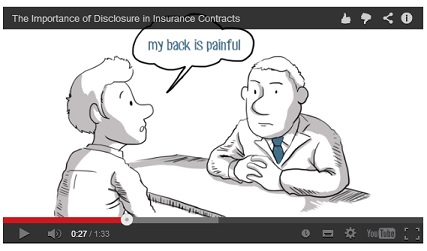Dealer group Synchron has produced a client-focused video to help advisers explain the risks of insurance non-disclosure.
The short animation outlines to clients the importance of disclosing all potential health issues to their adviser when completing an application for life insurance.
According to Synchron’s Independent Chair, Michael Harrison, non-disclosure is a major issue in the industry. He said that, as well as being one of the main reasons for claims being denied, insurance non-disclosure also put advisers at risk.
“We have even heard of an instance where an adviser is being sued for negligence because his client says he did not properly explain his Duty of Disclosure – despite the client signing an acknowledgement confirming his understanding.”
Mr Harrison said that while disclosure may adversely affect a client’s premium, this is a far better outcome than the risk of a claim being denied when the client is most in need. He added that clients may also not understand that under the Insurance Contract Act, they have a legal obligation to tell the insurer anything that might affect their decision to offer insurance.
“The video we have developed helps our advisers get that message through to clients and also saves them from having to repeat the same thing over and over to each client,” Mr Harrison said.
According to Baz Gardner, Founder of The Social Adviser, video is a great tool for answering common client questions.
“Video is another great ‘touch-point’ between you and your clients. They will really appreciate your proactivity. We know for a fact that video is a far more engaging way to address client queries compared to written text,” Mr Gardner said.
Click here to view Synchron’s disclosure video.





The industry/ world is in a very bad palce when: “We have even heard of an instance where an adviser is being sued for negligence because his client says he did not properly explain his Duty of Disclosure – despite the client signing an acknowledgement confirming his understanding.”
The latest CBA case says it all When it comes to matters of disclosure the Client’s word has much higher value in Court, according to the judge
Nothing advisers do can ameliorate that simple fact.
It seems nothing we can do ( emailed warnings, emailed videos etc ) even requests for client sign-offs, result in our testimony on what actually happened at least receiving the same value as the clients.
Comments are closed.